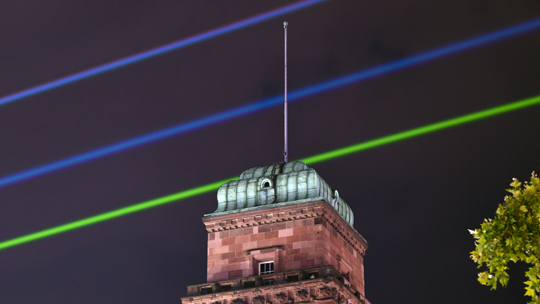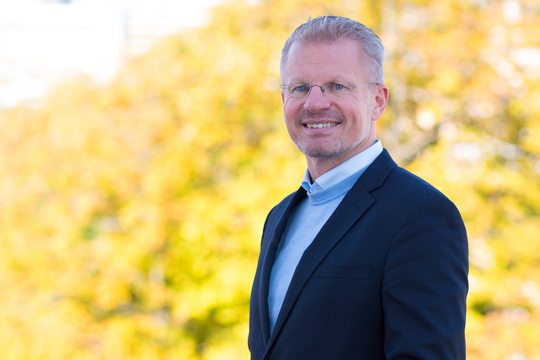Celebrating a long partnership
Freiburg, Sep 25, 2019
It is as old as the constitution. Seventy years ago the Fraunhofer-Gesellschaft was founded as a non-profit association. With its applied research, it sought to help the German economy and society to get back on its feet in the post-war period. Established scientific institutions, however, initially tended to view it as a competitor, even turning up their noses in the beginning stages. Only autonomous and pure basic research was regarded as "real science" by them. With five institutes, Freiburg developed into an important location for Fraunhofer research - and a strong partner for the University. Anita Rüffer asked Prof. Dr. Stefan Hiermaier how it came about. He is the director of the Fraunhofer Institute for High-Speed Dynamics, the Ernst Mach Institute, EMI and the Institute for Sustainable Technologies (INATECH) at the Faculty of Engineering as well as one of the two coordinators of the Sustainability Center Freiburg.

The Fraunhofer-Gesellschaft is celebrating its 70th year anniversary with a laser show. Photo: Patrick Seeger
Mr. Hiermaier, how is it that you are both the director of the Fraunhofer Institute and of another institute located at the University?
Stefan Hiermaier: For several years now, it has been customary for the directors of the Freiburg Fraunhofer Institutes to teach and conduct research at the same time as holding a professorship at the University. Fraunhofer employees can earn academic degrees at the University and the University’s students can do internships at Fraunhofer and gain insights into the work world.
The most visible sign of cooperation is INATECH, which you co-founded in 2015. What makes it so extraordinary?
It is unique in Germany that a university institute is financed and operated equally by the Fraunhofer-Gesellschaft and by a university. Each institution contributes to seven of the fourteen professorships. The various disciplines jointly conduct engineering-oriented sustainability research. We have developed an English-language Master’s program for which we receive more than 500 applicants from all over the world for the 45 slots available. It demonstrates how our focus on teaching and research really hits the mark.
Why do you need a Sustainability Center then, which apparently provided the impetus for the founding of INATECH?
The Sustainability Center is a type of umbrella for the overarching topic of sustainability in which the entire University with all its faculties, including the humanities, all five Fraunhofer Institutes and commercial partners participate. In order for an idea to become a sustainable step toward development, countless interrelationships must be considered. In electromobility alone, lightweight materials have to be developed that increase the range, but not the risk of accidents. Where does the energy come from? Which batteries are the best? Can a neighborhood provide enough electricity? Does production pay off for the manufacturers? Is the bottom line that it is really more ecological?

“We have learned to speak a common language.” Stefan Hiermeier appreciates the cooperation between the two institutions. Photo: Fraunhofer EMI
From redheaded stepchild to a full-blown partner of equal substance: What value have the Fraunhofer Institutes brought to the partnership?
Federal funding for the basic financing of the Fraunhofer-Gesellschaft has always been tied to the condition that two thirds of its budget be generated from research services for public and private clients from the industry. Therefore, it knows how to hold its own in the market and how to develop market-ready products from basic research that will advance a society.
Hasn’t the venerable University been rather fearful about impeding the necessary freedom required for research?
With our idea for a joint sustainability center in Freiburg, which became the first of eighteen in all of Germany today, we have pushed the window of opportunity wide open. The idea was born in 2014 at our Munich headquarters during a meeting with our President Reimund Neugebauer, who wanted to use the strong Fraunhofer location of Freiburg for innovative mergers. We identified the topic of sustainability as a characteristic research focus for Freiburg in which all participants found themselves. At the University, for example, the Faculty of Environment and Natural Resources has already been working on this.
Have there been any hiccups in the system since then?
We happened to have the right timing and the right people involved. I know that one of my predecessors failed in the 1980s due to the veto of the then Fraunhofer president, who prohibited cooperation with the University. The University has also not always been in favor of the idea.
And how can two things grow together that are so very different?
The common struggle for resources has brought us together. We have learned to speak a common language. The twelve three-year pilot projects in the Sustainability Center, for example, have been used in many ways. On the one hand, EMI materials researchers were able to learn from their biology colleagues how self-healing processes work in plants and how they can be transferred to synthetic materials. Ideally, it would lead to the self-repairing bicycle tube, for example. On the other hand, the projects were also good for practicing cooperation in a spirit of partnership. The fact that we are celebrating our Fraunhofer Festival in the heart of the University is certainly symbolic for the success of our partnership.
Fraunhofer Festival
The five Freiburg Fraunhofer Institutes are celebrating the 70th anniversary of the association by the same name with a big party on September 28, 2019 from 10 a.m. to 10 p.m. on the Platz der Weißen Rose. The festival offers hands-on experiments and a stage program that presents the Freiburg Fraunhofer Institutes’ research to the general public in an entertaining fashion.
More details about the program

